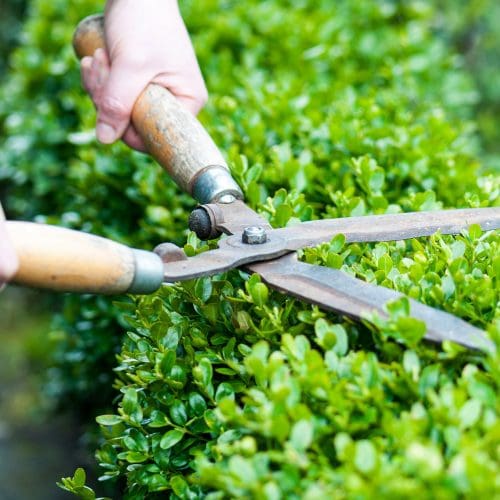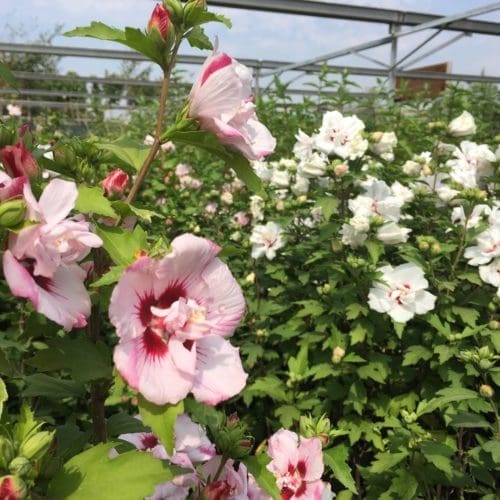1. The Big Clean
Now that winter is coming to an end it’s a great time to start clearing up all the mess that was made during storms and harsh weather. Start by clearing broken branches, leaves and other debris that have fallen on your lawn and flower beds. Its important to get this done now and before your spring bulbs start to pop up so there’s less risk of stepping on anything trying to grow. Don’t forget to put the dead organic matter you’ve collected into a compost bin otherwise there’s a higher risk of disease and bacteria growing and infecting your plants. Then you can start removing weeds from your beds before they begin to germinate and begin other clean up jobs such as sweeping and washing down pathways and patios.
2. Time for a trim
There are many plants that will benefit from being pruned this time of year such as deciduous shrubs and summer flowering shrubs. Start by removing dead, damaged and diseased branches and branches that are crossing over other branches. Then you can focus on pruning for your desired shape. Apple and pear trees are best pr uned in February whilst they are still dormant. If you haven’t done it yet, now’s the time to cut down perennials to the base that have browned off over winter so that the new growth can come through in spring. Whilst you’re doing this, if you find your perennials have outgrown their space, you can dig them up, divide them and replant in new areas or compost any excess. Deciduous Ornamental grasses, such as Calamagrostis or Pennisetum, are also ready to be cut down to a few inches from the base.
uned in February whilst they are still dormant. If you haven’t done it yet, now’s the time to cut down perennials to the base that have browned off over winter so that the new growth can come through in spring. Whilst you’re doing this, if you find your perennials have outgrown their space, you can dig them up, divide them and replant in new areas or compost any excess. Deciduous Ornamental grasses, such as Calamagrostis or Pennisetum, are also ready to be cut down to a few inches from the base.
3. Controlling pests
Its important to take precautions to avoid pests ruining your garden by cleaning up your garden like we discussed in point 1. However, this isn’t foolproof and pests can still be drawn to your plants. Finding and getting rid of pests whilst they’re still hiding from cold weather is a lot easier to do now rather than later whilst they’re all active. A very common pest you may come across in your garden are aphids. They are small and green and suck the sap from your plants leaving foliage damaged and droopy. A natural way of controlling these bugs is to either wash them away with strong spray water or apply hot pepper or garlic repellent sprays. Selecting plants that naturally repel common pests is another easy method for control. You can help your plants recover from pest damage by taking the time to keep your soil replenished and full of nutrients, this way the plant can defend itself a bit better.
4. Soil Preparation
Soil preparation is the key for maintaining happy and healthy plants, and late winter is a great time to get started. For empty beds, use a fork to turn the soil over and then rake over to help with airflow and drainage. This then makes your soil lighter and therefore easier for plants’ roots to push and work their way into the soil. Dig in organic matter, such as well rotted manure or recycled green waste, and this will add nutrients into the soil and improves structure. We recommend doing this a couple of weeks before planting so that the soil has time to mix in well.
5. Make a plan
So, you’ve done your cleaning, you’ve taken care of any plants already in the garden, and you’ve prepped your soil. Now it’s time to plan for spring! This is the most exciting part now that you can start to be more creative and add some colour, texture and different structures to your garden. Start by having a good look at your garden, what’s working well? What isn’t working well? What do you want to see more of in your garden? If you want to see more colour throughout the year, research plants that flower at different times so your garden is flourishing throughout the year. If you’re thinking of planting summer flowering bulbs, now is the time to plant them. There are many gardening and design principles that are easy to follow and gives you an idea of what to plant and where to position them. However, my favourite quote ‘there are no gardening mistakes, only experiments’ – Janet Kilburn Phillips, reminds me that there are no set rules for creating your own garden. Be bold, be creative, be your own gardener and create a garden that you enjoy.

Recent Comments